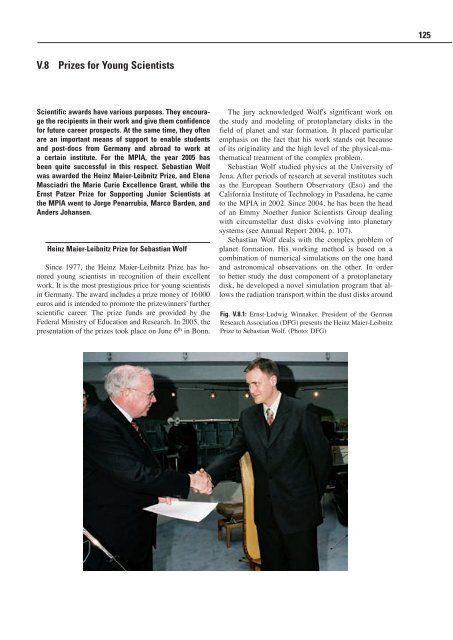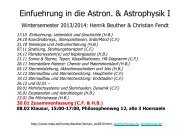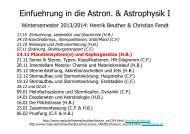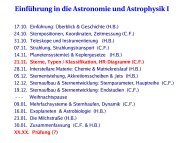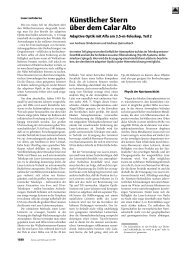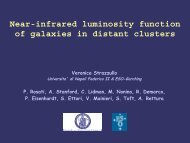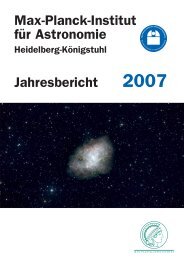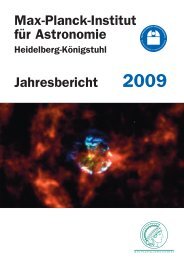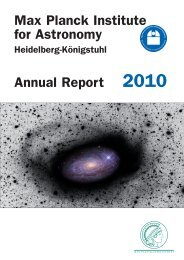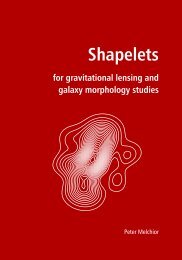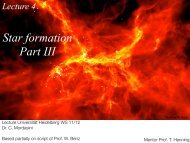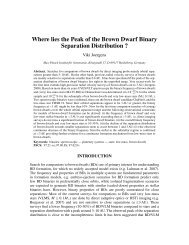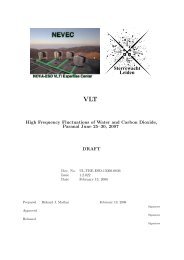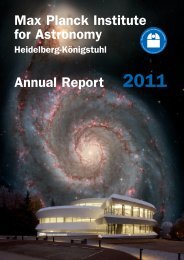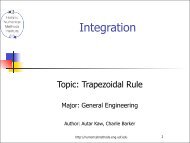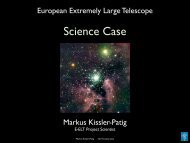Max Planck Institute for Astronomy - Annual Report 2005
Max Planck Institute for Astronomy - Annual Report 2005
Max Planck Institute for Astronomy - Annual Report 2005
You also want an ePaper? Increase the reach of your titles
YUMPU automatically turns print PDFs into web optimized ePapers that Google loves.
V.8 Prizes <strong>for</strong> Young Scientists<br />
Scientific awards have various purposes. They encourage<br />
the recipients in their work and give them confidence<br />
<strong>for</strong> future career prospects. At the same time, they often<br />
are an important means of support to enable students<br />
and post-docs from Germany and abroad to work at<br />
a certain institute. For the MPIA, the year <strong>2005</strong> has<br />
been quite successful in this respect. Sebastian Wolf<br />
was awarded the Heinz Maier-Leibnitz Prize, and Elena<br />
Masciadri the Marie Curie Excellence Grant, while the<br />
Ernst Patzer Prize <strong>for</strong> Supporting Junior Scientists at<br />
the MPIA went to Jorge Penarrubia, Marco Barden, and<br />
Anders Johansen.<br />
Heinz Maier-Leibnitz Prize <strong>for</strong> Sebastian Wolf<br />
Since 1977, the Heinz Maier-Leibnitz Prize has honored<br />
young scientists in recognition of their excellent<br />
work. It is the most prestigious price <strong>for</strong> young scientists<br />
in Germany. The award includes a prize money of 16 000<br />
euros and is intended to promote the prizewinners' further<br />
scientific career. The prize funds are provided by the<br />
Federal Ministry of Education and Research. In <strong>2005</strong>, the<br />
presentation of the prizes took place on June 6 th in Bonn.<br />
The jury acknowledged Wolf's significant work on<br />
the study and modeling of protoplanetary disks in the<br />
field of planet and star <strong>for</strong>mation. It placed particular<br />
emphasis on the fact that his work stands out because<br />
of its originality and the high level of the physical-mathematical<br />
treatment of the complex problem.<br />
Sebastian Wolf studied physics at the University of<br />
Jena. After periods of research at several institutes such<br />
as the European Southern Observatory (eso) and the<br />
Cali<strong>for</strong>nia <strong>Institute</strong> of Technology in Pasadena, he came<br />
to the MPIA in 2002. Since 2004, he has been the head<br />
of an Emmy Noether Junior Scientists Group dealing<br />
with circumstellar dust disks evolving into planetary<br />
systems (see <strong>Annual</strong> <strong>Report</strong> 2004, p. 107).<br />
Sebastian Wolf deals with the complex problem of<br />
planet <strong>for</strong>mation. His working method is based on a<br />
combination of numerical simulations on the one hand<br />
and astronomical observations on the other. In order<br />
to better study the dust component of a protoplanetary<br />
disk, he developed a novel simulation program that allows<br />
the radiation transport within the dust disks around<br />
Fig. V.8.1: Ernst-Ludwig Winnaker, President of the German<br />
Research Association (DFG) presents the Heinz Maier-Leibnitz<br />
Prize to Sebastian Wolf. (Photo: DFG)<br />
125


